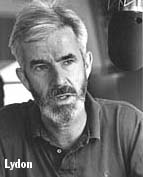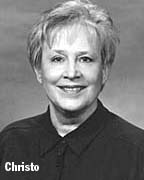Connection host, 'BUR fall apart over ownership
Originally published in Current, Feb. 26, 2001
By Mike JanssenThere's a disconnect in the world of The Connection, the brainy morning talk show from WBUR in Boston. Just weeks after NPR agreed to distribute the weekdaily program, the station put host Christopher Lydon and senior producer Mary McGrath on two weeks of paid leave, casting a shadow over the program's formerly sunny future.
Most of the show's staff responded by resigning Feb. 16 [2001], a day after Lydon and McGrath were put on leave. NPR Technology Correspondent John McChesney fills in for Lydon this week, and WBUR's Graham Smith has taken up McGrath's duties.
Both sides want resolution, but it may be hard-won. Program staff and WBUR management agree on at least one thing: the ball is in the other's court. While the station cited personnel matters in suspending McGrath and Lydon, the two say the real issue at stake is their wish to co-own their show with WBUR. General Manager Jane Christo opposes the idea, but to Lydon it's key. Last year, he asked Christo for a 50-50 partnership.
"WBUR locked out its flagship broadcast rather than negotiate the riddle of who owns it," he said in a statement that he dictated to Current. "Here are the questions for everyone in public broadcasting to think about: should the creators of a successful program have some equity stake in the fruits of syndication? Can the many talents that drive the growth of a show and a station lay some reasonable claim to their intellectual product?
"Or, do all the income and archives, all the credit and control, belong to the brokers here--to the 'content distributors' as opposed to the 'content creators?'" (Lydon's webspeak meshes with his claim that innovations in the new media world have driven his entrepreneurial spirit.)
But WBUR rejects giving any degree of ownership to the staff. "We're not in a position to be venture capitalists for a profit venture, or to have our listeners and our contributors be venture capitalists for a profit venture," said spokeswoman Mary Stohn.
"WBUR feels that this proposal is incompatible with the station's mandate as a nonprofit institution and incompatible with our reliance on individual contributions for more than half our financial support," the station said in a statement. "WBUR has no interest in any for-profit venture."
"A two-way street . . . or none at all"
In the letter to Lydon and McGrath announcing their paid leave, Managing Director of News and Programming George Boosey cited "your rejection of normal management oversight and established WBUR policies," and said "the leave of absence will afford you time to consider whether or not you wish to continue your employment with WBUR."
He cited several disputes, alleging that, during a closed-door meeting, McGrath yelled at Christo so loudly that colleagues overheard the outburst. He also noted an instance last year in which Lydon refused to fund-raise.
At the time, Lydon wrote Boosey, "You'll make it a two-way street with me, George, or there will be none at all." Lydon has also written, in a letter to NPR President Kevin Klose, that WBUR is "a system of harassment that calls itself management."
Despite the disagreements, WBUR recently offered Lydon and McGrath remarkably high salaries for public radio--$280,000 for Lydon, and $165,000 for McGrath, with possible annual $50,000 bonuses. By Christo's account, that would make them the highest paid host and producer in public broadcasting. Even NPR hosts typically have earned much less--the best paid is Bob Edwards, who made $206,000 in 1999.
But part-ownership means more: a stake in the show's future with NPR. By switching from PRI to NPR, WBUR hoped to boost the visibility of the program, which airs on about 75 stations. The new deal brings $50,000 to the show, and that figure is expected to rise. In addition, the deal requires The Connection to add an extra break to conform to the network's standardized clock. That could bring in an additional $572,000 in underwriting revenue, by WBUR's estimate.
The Boston Globe quoted another WBUR estimate suggesting revenues could rise from $2 million to $8 million in the next five years.
"The program is driven entirely by the taste, ideas, reading, experience, curiosity, and enthusiasm of a brilliant and insanely hard-working Connection team," Lydon said. "Everybody knows this, but when it came to the multi-million dollar sale of distribution rights, the brokers claimed the proceeds entirely. Who would sell a house through such a broker?"
A Rose by another name?
Principals in the standoff are two of WBUR's most noted personalities. Christo has a reputation for being gutsy, driven and focused, qualities which helped her build WBUR into what it is today. And, despite his show's relatively slow six-year creep to the 75-station mark, Lydon stands out for his intellectualism and wide-ranging interest. The Connection covers current events, sure. But what other national talk shows (in this country, anyway) would execute a nine-week series about philosophy, for example?
Writing in the Atlantic Monthly, Bill McKibben called Lydon "general interest incarnate." Every day, McKibben wrote, Lydon "demonstrates how radio can be so much more than aural wallpaper."
Such a show draws a crowd, and, since Lydon left the air, WBUR has received hundreds of e-mails, letters and phone calls about his departure. Stohn says more than half the responses urge WBUR to resolve the standoff. A quarter have threatened to stop supporting the station if Lydon doesn't return. Nearly a fifth support WBUR management.
Will Lydon's fans get their wish? WBUR and The Connection both say they want the show--with Lydon and McGrath--on the station's air. But the fundamental difference over ownership remains.
"The BBC and PBS have been through this question and settled it, to my understanding, with meaningful recognition of program authors," Lydon said, and went on to cite Bill Moyers and Charlie Rose as examples. "It will be a good thing for all of us when public radio recognizes where value originates, when public radio sees, as the best young businesses do, that 'the company goes out the door every night.'"
. To Current's home page . Outside link: The Connection
Web page posted Feb. 26, 2001
Current
The newspaper about public television and radio
in the United States
A service of Current Publishing Committee, Takoma Park, Md.
E-mail: webcurrent.org
301-270-7240
Copyright 2001


